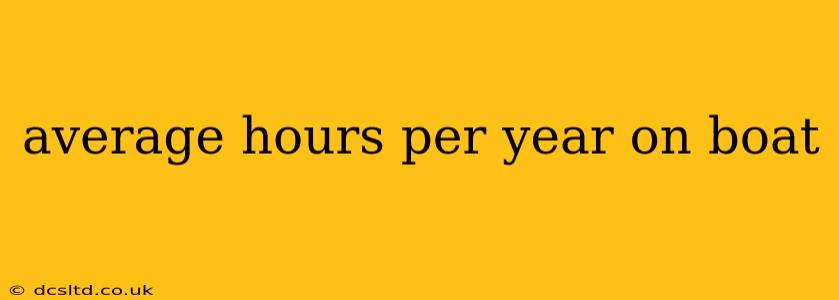Average Hours Per Year on a Boat: A Deep Dive into Boating Time
For many, the dream of owning a boat conjures images of endless sunny days on the water. But how much time do boat owners actually spend on their vessels? The answer, unfortunately, isn't a simple number. The average hours per year spent on a boat varies wildly depending on several key factors. This article delves into those factors and helps you realistically assess how much time you might spend on your boat.
What Factors Influence Annual Boat Usage?
Several factors significantly impact the number of hours a boat is used annually. These include:
-
Geographic Location: Boat owners in warmer climates with longer boating seasons will naturally log more hours than those in areas with shorter, colder seasons. Coastal regions generally see higher usage than inland lakes.
-
Boat Type: A small fishing boat might be used for short, frequent trips, accumulating many hours over the year. A larger cruiser or sailboat might see fewer, longer trips, resulting in fewer total hours.
-
Personal Lifestyle and Commitments: A retired couple will likely have more time for boating than a busy family with young children. Travel schedules and work commitments also play a significant role.
-
Boat Storage: If a boat is kept in a marina, it's more readily accessible and likely to see more use. A boat requiring trailering to a launch site may see less frequent use.
-
Maintenance and Repairs: Unexpected maintenance or repairs can significantly reduce the time available for recreational boating.
How Many Hours Do Most Boat Owners Use Their Boats Each Year?
There's no definitive, universally agreed-upon average. However, based on anecdotal evidence and industry surveys (which are often limited and not always publicly accessible), a reasonable estimate might be anywhere between 20 to 100 hours per year. The lower end of this range represents owners with limited time or those whose boats primarily serve as seasonal or occasional pleasure craft. The higher end reflects frequent users in favorable climates with ample free time.
Keep in mind that these are rough estimates. Many owners may fall outside this range, spending far fewer or significantly more hours on the water.
What About Different Types of Boats?
The type of boat heavily influences usage.
-
Fishing Boats: These are often used for shorter, more frequent trips, potentially racking up higher annual hours.
-
Cruisers: Larger cruisers are often used for longer, less frequent trips, resulting in a lower annual hour count.
-
Sailboats: Sailboat usage depends on weather conditions and the owner's sailing experience and commitment. Some sailboats might accumulate significant hours, while others are used less frequently.
How Can I Estimate My Personal Boat Usage?
To get a more personalized estimate, consider your own circumstances:
- How many weekends per month do you anticipate boating?
- How many weekdays do you think you’ll be able to use the boat?
- What is the average length of your boating trips?
- What is your typical boating season?
By honestly assessing these questions, you can develop a more accurate prediction of your annual boat usage.
Is it Worth Owning a Boat if I Can Only Use it for a Few Hours Per Year?
The decision to own a boat is highly personal. While some might find even limited use worthwhile for the pleasure it provides, others might find the cost and maintenance burdens outweigh the infrequent enjoyment. Carefully weigh the financial commitment against your lifestyle and realistic expectations for usage. Boat ownership is a significant undertaking, and it's crucial to ensure you can afford the expenses and have sufficient time to enjoy it.
Remember, these are general guidelines, and your individual experience may differ significantly. The key is realistic assessment of your lifestyle, commitments, and financial resources. Accurate self-assessment will allow for better decision-making when considering boat ownership.
